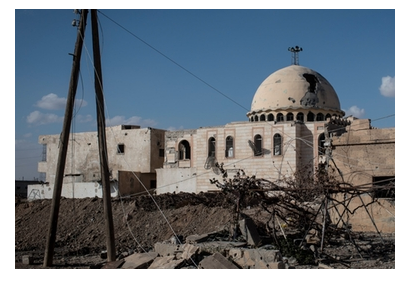Managing Syrian Conflict May Be Possible. Resolving It Isn’t.

[Report for The Century Foundation.]
How much, if at all, should the West be involved in Syria as Bashar al-Assad rebuilds the country? The United States and its allies in Europe failed in almost all their policy aims, and the dictator they sought to topple appears to have survived comfortably in power. TCF fellows Thanassis Cambanis and Sam Heller initially set out to write a joint policy recommendation for how the West should approach the conundrums of aid and reconstruction in Syria; but our disagreements proved more instructive than our common ground. What follows is a written dialogue about the Western policy options for dealing with Syria going forward on matters of humanitarian aid, reconstruction, diplomatic relations, and other potential areas of cooperation.
Thanassis Cambanis: Is there any such thing, at this stage, as a good U.S. or Western policy for Syria? This question has been coming up with increasing intensity as the conflict winds down into a final stage. Notwithstanding some arguments that the conflict might drag on for quite a few years, I am convinced that—absent some major game-changing shift—Bashar al-Assad and his allies have won the war. Damascus is now focused on reconquering all of Syrian territory, consolidating its authority, and rebuilding its networks and institutions.
I want us to address a range of questions in this dialogue, including some disagreements between us, about aid, reconstruction, the ethics of engagement with Syria, and the West’s strategic interests in Syria going forward. The recent focus has rightly been on the military imbroglio in northern Syria, which involves Turkey, the United States, and their various Arab and Kurdish proxies. In the long term, however, the West’s most intractable problems have to do with Assad and his government in Damascus.
For the United States and its European partners, this is an ugly and confusing moment. Washington and its hardline anti-Assad allies in Europe seem stuck: they failed to topple Assad, and they don’t want to deal with him. They made strategic commitments in Syria that no longer make sense, but they recognize that Syria is too important for them to try to simply wash their hands of it. Now they have to figure out how to deal with a Syria still under Assad, and still in conflict.
Some of the Western interests at stake in Syria are obvious. Pressing concerns like the Islamic State, or the stabilization of the vast desert zone that stretches between Baghdad and Damascus, require unstinting attention. There are systemic pressures to engage with Assad from many Western quarters, as well. Humanitarians want to distribute aid in regime-controlled Syria, no matter how problematic the regime’s practices of preventing access to civilians considered disloyal. Public and private interests want the West to invest in rebuilding Syria, some for cynical reasons of profit, others for well-meaning reasons of wanting to help the Syrian population that has suffered from a grueling war. Intelligence and security services want to share information with Damascus and engage in joint counterterrorism efforts. Diplomats want to reopen communications channels that were hastily severed during the brief period when many Westerns assumed that Assad was on his way out.
What’s next in a postwar Syria? How do we deal with reconstruction, the aid regime in Damascus, and the more fundamental question of normalization? On what level should the West engage with Damascus at all? At some point, do we resign ourselves to Assad remaining? And what do we do for the Syrian civilians who, through no fault of their own, live under Assad’s rule?
Assad still rules Syria
Sam Heller: Right, these are the big questions policymakers—and anyone who’s vested in this conflict, and in the future of Syria—have to grapple with. And I hope I’m not pulling back the curtain too far here, but we weren’t originally planning to publish this sort of dialogue. We were going to co-author a piece, but it turned out we actually have some big, substantive differences, even as we agree on other key points. After talking it through, we decided it would be more interesting to interrogate those disagreements, rather than write a consensus piece that was brought down to our lowest, least-challenging denominator.
The reality we face is this: Whatever the outcome of this war—and that outcome now seems clearer, day by day—at its end, Syria will not somehow end with it. Syria will continue to exist, as a geopolitical reality, but also as a society and a people.
We need to weigh how to deal with a postwar Syria that is still ruled by Assad, but which is populated by Syrians who have endured years of hardship and death and who are not somehow to blame.
Read the rest of the dialogue at The Century Foundation.

